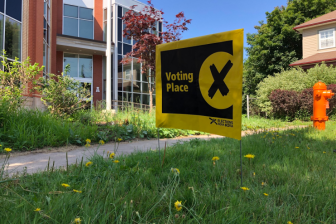TORONTO — The number of college students picking to understand remotely appear September is substantially higher in some of Ontario’s COVID-19 warm places, as the fourth wave of the pandemic has some mother and father anxious about the risk of an infection in educational facilities.
The Toronto District University Board – the greatest board in the province – is reporting that about 14 for each cent of its pupils have opted out of in-man or woman mastering.
The Peel District Faculty Board – in a person of the regions toughest strike by COVID-19 – claims that 18 for each cent of elementary college students and 20 for every cent of high schoolers will remain residence.
In other places in the province, faculty boards are reporting vastly different numbers.
Examine extra:
86% of TDSB students want to return for in-human being understanding amid stricter COVID-19 protocols
The Limestone District School Board based mostly out of Kingston, Ont., reported only two per cent of college students will study remotely when school resumes, when the Halton District Faculty Board and the Ottawa-Carleton District School Board both equally say roughly six for every cent of their learners have chosen the digital discovering possibility.
But just one Ottawa-Carleton mother or father whose young ones are headed for in-individual learning claimed she’s second-guessing her conclusion because of to the fourth wave of the pandemic, which is fuelled by the really contagious Delta variant.
“We experienced to make the decision among digital university and in-particular person school back in March,” stated Kimberly Callard. “That was just before Delta existed in Canada. That was prior to the third wave even started out.”
She said she was supplied the likelihood to change her thoughts in May possibly, but the college board’s wording created her imagine the option was only for households whose personal scenarios experienced altered.
“Our spouse and children instances technically however have not altered,” she said. “It’s the community and COVID predicament that is improved.”

Callard, who has two incoming fifth-graders and a seventh-grader, stated that she’d desire to continue to keep her two more youthful kids — who are not nevertheless eligible for the COVID-19 vaccine — at home.
“It’s a really hard conclusion, mainly because I do imagine they overlook obtaining friends at university,” she explained. “I consider they pass up the in-person interactions. But also, I want to keep them harmless.”
Callard mentioned she’s achieved out to numerous people at the board, but has yet to listen to again.
She stated she’d also be joyful if the Ottawa-Carleton board included some extra safety actions, further than what the province has mandated.
That is a stage the TDSB claimed it would choose in a distinctive assembly of the Organizing and Priorities Committee this week.
For instance, the TDSB’s presentation reads: “Elementary students will keep on to choose breaks inside cohorts with bodily distancing.” The ministry has mentioned elementary college students need not stay in their cohorts during recess.
The Ministry of Education OK’d audio and singing indoors “with masking inspired exactly where distancing simply cannot be managed,” but the TDSB claimed it will only enable indoor singing with masks and actual physical distancing.
The ministry has also permitted indoor assemblies, but the TDSB reported it will not be performing them. As a substitute, faculties can have virtual or outdoor assemblies.
The TDSB’s planning presentation — alongside with info from the Peel District Faculty Board — also delivers some insights into who will be returning to college in particular person.
In the two of people boards, students at what the TDSB phone calls “key transition points” — junior kindergarten and Grade 9 — are a lot more likely to choose for in-human being studying.
Only nine for every cent of Toronto pupils in those people grades chose the on the net studying possibility, as did dad and mom for 13 per cent of junior kindergarten students in Peel and 12 for every cent of Quality 9 pupils.
– With data files from Allison Jones




© 2021 The Canadian Press







More Stories
Why More Parents Are Choosing Online School
Online School Tools That Boost Productivity
Breaking Myths About Online School Experiences